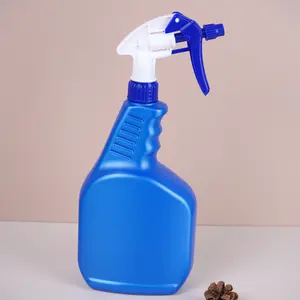
Pesticide Wholesale 1000ml Blue PE Trigger Spray Bottle Hand Button Pesticide Bottle 1 Liter Oil Smoke Spray Bottle





















Pesticides play a crucial role in agricultural and urban settings, managing a variety of pests that can affect plant and human health. As a broad category, pesticides encompass substances designed to control, repel, or eradicate pests. This includes a range of products from insecticidal soap used in gardens to rodenticides for controlling rodent populations. It's essential to understand the types, applications, and safety considerations associated with these chemicals to ensure effective and responsible use.
The pesticide industry offers a diverse array of products, each tailored for specific pests and environments. Insecticides, such as pyrethroids, target insects by disrupting their nervous systems, while herbicides, including glyphosate herbicide, are formulated to eliminate unwanted vegetation. Fumigants are gaseous pesticides used to sterilize soil or storage facilities, and bio pesticides represent a growing category that utilizes natural organisms or substances derived from them. The application of these products varies; some are suitable for large-scale agricultural use, while others, like pet safe herbicide, are designed for domestic environments where safety is paramount.
When selecting a pesticide, it's important to consider its formulation. Products may come in liquid, granular, or powder forms, each with specific handling and application methods. The material composition of a pesticide determines its mode of action and effectiveness against certain pests. For instance, chlorpyrifos is a common ingredient in agriculture, whereas insecticidal soap is a milder option often used for pesticide control in organic farming.
The advantages of using pesticides are numerous, including improved crop yields and the prevention of vector-borne diseases. However, responsible usage is key. Users must read labels carefully to ensure the target pest is listed and to understand the correct application sites. Indoor and outdoor environments may require different treatment approaches, and some products, like flea killer for yard, are formulated specifically for outdoor use. It's also crucial to consider the life stage of the target pest, as some products are only effective at certain stages of development.
While pesticides are beneficial in controlling pests, they can also pose risks to the environment, non-target organisms, and human health if misused. It's imperative to follow the recommended application rates and frequency to minimize any potential adverse effects. Purchasing the correct quantity is also important, as storing large amounts can lead to reduced efficacy over time. For those seeking environmentally friendly options, bio pesticides offer an alternative that can be less toxic to non-target species and degrade more rapidly in the environment.
In conclusion, whether for agricultural, commercial, or personal use, understanding the various aspects of pesticides is essential for effective pest management. By considering the type of pesticide, its application, and safety measures, users can make informed decisions that balance pest control needs with environmental and health considerations. For a comprehensive selection of pesticide options, Alibaba.com serves as a global marketplace, connecting buyers with a diverse range of suppliers to meet their specific pest control requirements.